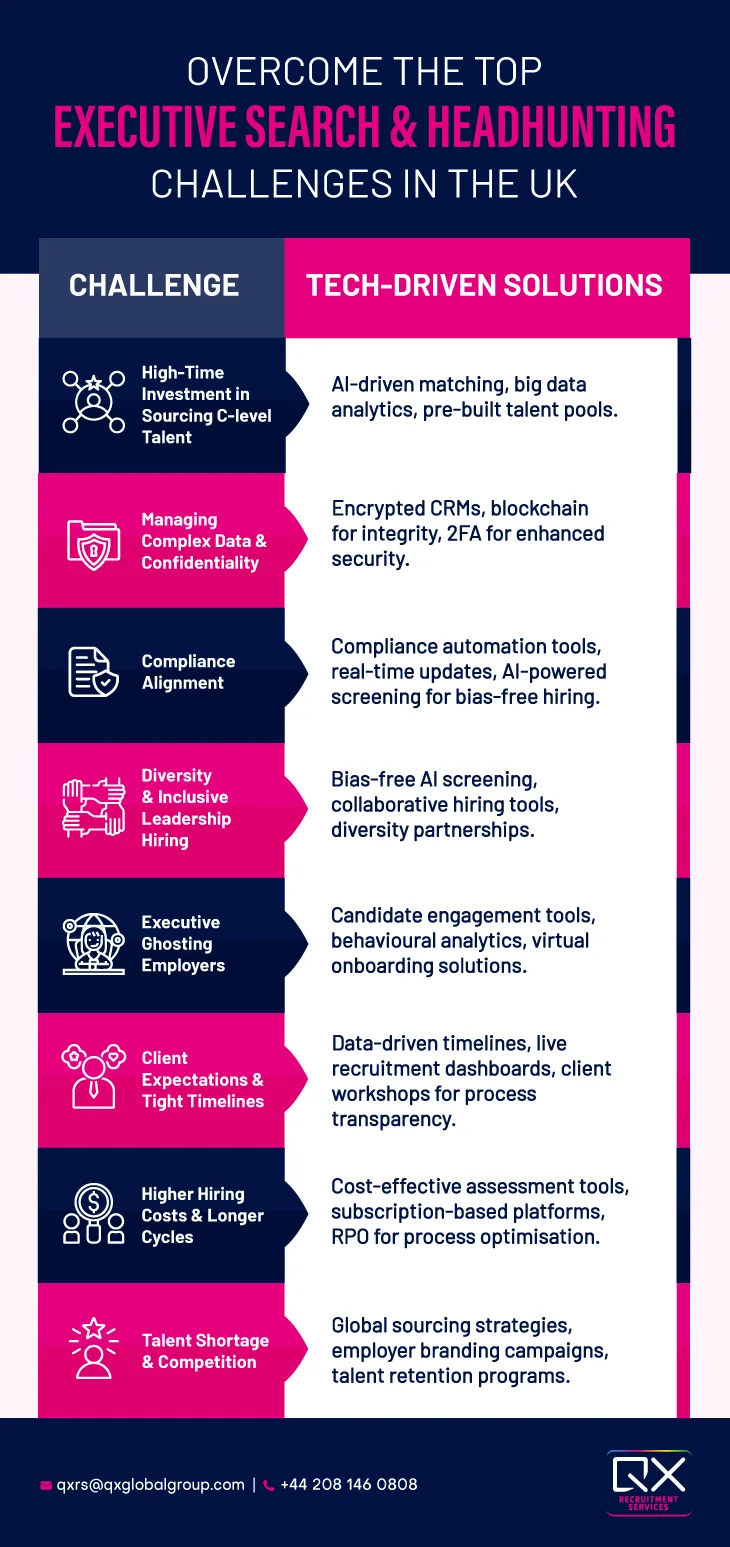In the UK, executive search and headhunting challenges are some of the toughest recruiters. Hiring senior leaders, C-suite executives, and directors isn’t just about filling vacancies, it’s about driving long-term organisational growth. But with rising costs, longer hiring cycles, compliance pressures, and talent shortages, executive search recruitment has become increasingly complex.
In this blog, we’ll explore what executive search is, what is headhunting in recruitment, the key challenges in 2026 faced by executive search companies, and effective strategies to overcome them.
What Is Executive Search?
Executive search recruitment is a specialised process designed to identify and hire senior executives such as CEOs, CFOs, and directors. Executive search companies use a research-driven, consultative approach to ensure both skill and cultural fit.

What Is Headhunting In Recruitment?
Headhunting recruiting involves directly approaching highly skilled professionals. These people are those who are not actively seeking new opportunities, and persuading them to consider senior-level roles. Unlike volume hiring, it’s a focused and proactive strategy used in executive search and headhunting to attract niche leadership talent.
8 Biggest Executive Search And Headhunting Challenges In The Uk
Challenge 1: Extensive Time Required to Source C-Suite Talent
The Problem: Executive roles often require candidates with specific skill sets, experiences, and leadership qualities. According to a 2024 CIPD report, recruiting C-level talent takes an average of 8-12 months, with firms investing 60% more hours compared to mid-level hires.
Solution
- AI-Driven Candidate Matching: Advanced platforms like Eightfold AI and HireVue use machine learning to scan millions of profiles, match candidates with job requirements, and predict success based on historical data. This approach reduces sourcing time by up to 45%.
- Big Data Analytics: Tools like SeekOut analyse candidate trends, including employment shifts and leadership trajectories, providing recruiters with actionable insights.
- Pre-Built Talent Pools: Building evergreen databases segmented by industry and expertise enables firms to initiate outreach instantly when new roles emerge.
Challenge 2: Navigating Complex Data and Maintaining Confidentiality
The Problem: Handling sensitive data, especially for C-suite roles, is critical. A 2024 UK Cybersecurity Audit revealed that 35% of recruitment firms suffered data breaches involving candidate information.
Solution
- Encrypted CRM Systems: Recruitment platforms such as Bullhorn and JobAdder now offer end-to-end encryption, safeguarding candidate and client data against unauthorised access.
- Blockchain for Data Integrity: By using blockchain technology, firms can secure records of candidate interactions and ensure tamper-proof confidentiality.
- Two-Factor Authentication (2FA): Mandating 2FA across all recruiter and client accounts minimises risks of unauthorised data access.

Challenge 3: Ensuring Compliance with Evolving Hiring Regulations
The Problem: Navigating complex regulations like IR35, GDPR, and equal opportunity laws is increasingly challenging. Non-compliance can result in hefty fines—up to £17.5 million for GDPR breaches.
Solution
- Compliance Automation: Tools like Workday and Breezy HR automatically flag potential violations during recruitment processes, ensuring adherence to UK labor laws.
- Real-Time Regulatory Updates: Platforms such as LegalMonitor keep recruiters informed about changes in UK employment laws.
- AI-Powered Candidate Screening: Ensures equal opportunity compliance by eliminating unconscious bias, a critical step for diversity and inclusion mandates.
Challenge 4: Promoting Diversity and Inclusion in Leadership Hiring
The Problem: Despite rising awareness, 43% of UK firms failed to meet their diversity hiring targets for leadership roles in 2024, according to a LinkedIn Talent Trends report.
Solution
- Bias-Free AI Screening: AI platforms like Textio flag potentially biased language in job descriptions, making them more inclusive.
- Collaborative Hiring: Introducing structured interview processes using tools like BrightHire ensures decisions are based on data, not subjective judgment.
- Partnerships with Diversity Networks: Collaborate with organisations such as Diversity UK and Women on Boards to tap into specialised leadership talent pools.
Challenge 5: Senior Executives Backing Out Midway
The Problem: Ghosting—where candidates disengage without notice—has grown alarmingly in senior-level recruitment. 28% of recruiters in the UK reported instances of ghosting in 2024, often after significant time investment.
Solution
- Candidate Engagement Platforms: Tools like Candidate.ID track candidate interactions and send timely, personalised updates to maintain interest.
- Behavioral Analytics: AI can identify patterns indicating disengagement, such as delays in response times, allowing recruiters to act preemptively.
- Virtual Onboarding Solutions: Using platforms like Sapling HR ensures executives remain engaged throughout their notice periods and beyond.

Challenge 6: Unrealistic Client Expectations and Tight Deadlines
The Problem: Clients often demand expedited timelines for executive hires, with 60% of recruiters citing unrealistic deadlines as a key challenge.
Solution
- Data-Driven Timelines: Use tools like TalentNeuron to provide clients with data-backed timelines based on industry benchmarks, making expectations more realistic.
- Live Recruitment Dashboards: Platforms like Zoho Recruit allow clients to monitor progress in real-time, fostering transparency and trust.
- Educating Clients: Incorporate workshops or consultations to inform clients about the intricacies of executive hiring cycles.
Challenge 7: Higher Executive Hiring Costs & Longer Hiring Cycles
The Problem: The cost per hire for C-level roles in the UK surged to £30,000 in 2024, with 50% of firms struggling to justify these expenses to clients.
Solution
- Cost-Effective Assessment Tools: Leverage video interview platforms like Modern Hire, saving 40% on in-person assessment costs.
- Subscription-Based Tools: Platforms like Vincere offer pay-as-you-go models, reducing upfront investments for smaller recruitment firms.
- Process Optimisation with RPO: Recruitment Process Outsourcing allows firms to outsource repetitive tasks, focusing resources on high-value activities.
Challenge 8: Increasing Competition & Executive Talent Shortage
The Problem: The UK faces a 20% shortfall in senior executive talent, exacerbated by Brexit’s impact on the talent pool and increasing global competition.
Solution
- Global Sourcing Strategies: Utilise platforms like LinkedIn Recruiter `International to identify talent beyond the UK.
- Employer Branding Campaigns: Showcase client organisations as leaders in innovation and employee satisfaction through platforms like Glassdoor.
- Talent Retention Programs: Develop strategies that encourage internal promotions, reducing reliance on external hiring.

What is the Difference Between Headhunting and Executive Search?
While the terms are often used interchangeably, headhunting and executive search differ in scope and execution:
- Headhunting: A targeted approach focused on identifying and persuading specific high-value candidates to consider a role, often without a formal application process. This is more suited for mid to senior-level roles.
- Executive Search: A comprehensive, consultative process aimed at sourcing, vetting, and placing top-tier leadership candidates. It involves in-depth market research, multiple assessments, and long-term relationship building.
Key Insight: According to a 2024 REC survey, 75% of UK firms now prefer executive search firms for C-level roles due to their systematic and strategic methodology.
What Does an Executive Headhunter Do?
An executive headhunter acts as a bridge between organisations and high-level candidates. Their role includes:
- Market Research: Identifying industry leaders and trends to create a pool of qualified candidates.
- Talent Mapping: Analysing leadership structures across companies to understand where potential hires fit.
- Direct Engagement: Building relationships with prospective candidates, including those not actively seeking new roles.
- Candidate Evaluation: Conducting competency-based interviews and psychometric assessments to gauge suitability.
Tech Leverage: Platforms like LinkedIn Sales Navigator and Apollo.io have revolutionised outreach, enabling precise targeting of executive talent.
How Do Executive Search Companies Work?
Executive search firms follow a structured, multi-phase approach:
- Client Consultation: Understanding the organisation’s strategic goals, cultural values, and role requirements.
- Sourcing Strategy: Leveraging AI-powered tools like Entelo and HiringSolved for data-driven talent identification.
- Candidate Screening: Conducting comprehensive background checks, including education, employment history, and legal compliance.
- Shortlisting & Presentation: Providing clients with a curated list of the best-fit candidates.
- Onboarding Support: Assisting with contract negotiation, relocation, and onboarding to ensure long-term success.
Fact: In 2024, 87% of UK executive search firms incorporated AI to streamline candidate sourcing and improve placement accuracy.
What Makes a Good Executive Search?
A successful executive search hinges on several factors:
- Customisation: Tailoring the search process to align with the client’s industry and organisational goals.
- Cultural Fit: Ensuring candidates align with the company’s values and leadership style.
- Timeliness: Balancing thoroughness with speed to meet critical hiring deadlines.
Metrics Matter: According to 2025 UK recruitment insights, executive search firms with a candidate retention rate of over 90% are seen as the gold standard in the industry.
What Role Does Networking Play in Successful Headhunting in the UK?
Networking remains a cornerstone of headhunting success, especially in the UK, where 70% of executive hires result from personal referrals. Key strategies include:
- Building Relationships: Regular engagement with industry leaders and attending sector-specific conferences like the UK Leadership Summit.
- Leveraging Digital Networks: Platforms like LinkedIn Recruiter and Slack Communities provide instant access to influential professionals.
- Alumni Connections: Collaborating with university and business school alumni networks for fresh talent.
Emerging Trends: The rise of virtual networking events in 2024 has enabled firms to connect with global talent more efficiently.
Also Read: Why Headhunters Recruitment Is Important for Senior Hiring in the UK?
What are the Key Factors to Consider When Negotiating Executive Compensation Packages?
Compensation is often a dealbreaker for top-tier talent. Key considerations include:
- Market Benchmarks: Using platforms like Payscale and Glassdoor to ensure competitive offers.
- Flexibility: Incorporating non-monetary benefits such as hybrid work options, stock options, and wellness packages.
- Transparency: Clearly outlining performance bonuses, growth opportunities, and contractual obligations.
Stat: In 2024, UK firms reported a 15% increase in compensation packages for leadership roles, driven by rising demand and limited supply of executive talent.
Executive Search & Headhunting is not just about filling positions; it’s about transforming organisations by sourcing visionary leaders. By understanding these foundational aspects and embracing innovative practices, UK recruitment firms can overcome challenges and set new benchmarks in executive hiring.
How Does Outsourcing Executive Search and Headhunting Services Help?
Outsourcing your executive search & headhunting services to experts like QX Global Group, allows firms to bypass many of the hurdles discussed above. Partnering with QX gives staffing firms and employers access to:
- Pre-built executive talent pools across industrie
- Faster and more efficient executive search recruitment processes
- Full compliance with UK regulations (IR35, GDPR, equality laws)
- AI-driven sourcing, screening, and candidate engagement tools
- Cost savings by scaling with offshore recruitment support.
Conclusion:
Executive search and headhunting recruiting are critical for placing leaders who can transform organisations, but they come with unique challenges. By understanding what executive search is, what is headhunting in recruitment, and the 8 biggest challenges in this space, recruitment firms can adopt smarter, technology-driven, and compliant strategies.
Book a Consultation for Executive Search & Headhunting
Need help finding top leadership talent? Schedule a consultation to solve your executive search challenges and secure the right leaders for your team.
Originally published Nov 22, 2024 08:11:05, updated Feb 02 2026
Topics: Candidate Sourcing, Executive Search & Headhunting, Sourcing
Don't forget to share this post!
